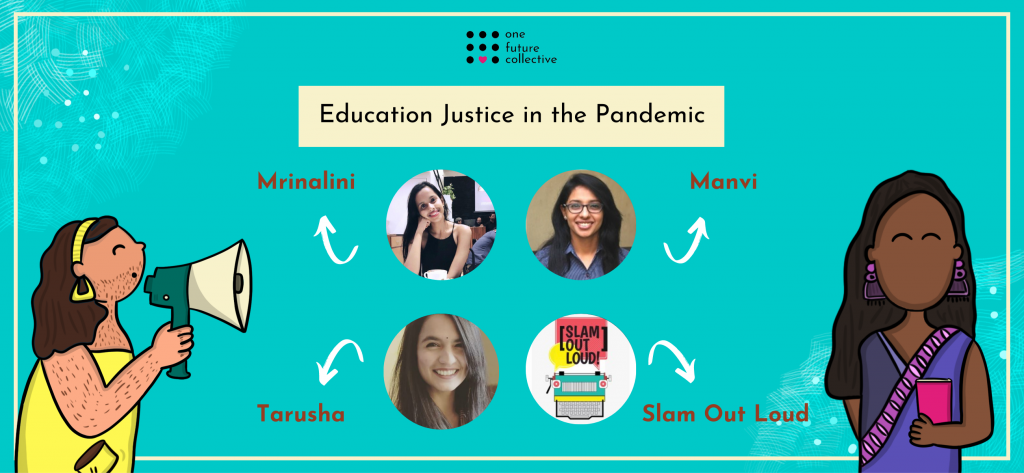On 15th February, One Future Collective hosted a live session on ‘Education Justice in the Pandemic’. Mrinalini, an educator at the ClayLabs Education Foundation coordinated the session with discussants Manvi, co-founder of Alokit; Drashti from Slam Out Loud; and Tarusha, an action researcher at HumanQind. The session aimed to understand the impact of the pandemic on the education sector from on-ground activists and social workers involved in the field. The session also critically looked at the gaps in policies that address inequality in access to education.
The IG live began with discussing the effects of COVID-19 on the education sector and how students, teachers, and educators have been deeply impacted. Mrinalini set the context with statistical facts and data about education inequality worldwide, including India, where 45% of the students drop out before pursuing higher education. As education was never envisaged to be imparted over a laptop or through the virtual medium, Mrinalini asked each speaker about their own experience of adapting to the pandemic.
Manvi mentioned how ‘Alokit’ shifted to providing help to the teachers and principals and came up with customized needs-based programs to help educators become familiar with online modes of learning and teaching. Drashti, as a part of Slam Out Loud, admitted that the onset of the pandemic was a confusing and challenging time in the country, especially since education wasn’t a priority. However, they noticed different organizations collaborating to ensure children’s basic needs and provide access to necessary devices for online learning. Their organization made a curriculum that was accessible even through WhatsApp and set in a checking system with students to ensure their well-being. Tarusha spoke of how HumanQind aimed to share power with young children and involved them in decision-making. HumanQind assisted the schools with reopening and gave the young children a platform to voice their opinions. During their work, they witnessed how the entire school ecosystem was in severe mental distress, with teachers and principals facing burnout and fatigue.
The speakers then discussed their learnings from the pandemic. Drashti shared how children weren’t as interested in academic writing practices but responded very well to art-based activities like theatre, storytelling, or poetry. The children also found it challenging to interact freely or collaborate in social groups as they were isolated for a long time. Thus, Slam Out Loud had to tap into the socio-emotional reserves of the children along with all the resources they had on hand.
Tarusha also agreed with how children no longer had a fixed routine to pay attention to and how they were losing friends due to online schooling. They talked about the importance of creating trust-building and partnerships inside the school and adopting a collaborative approach towards school reopening. Manvi added the importance of teaching students to cope with stressful situations and focusing on their well-being.
The conversation then turned to how each of the speakers addressed the learning loss resulting from the pandemic and the challenges they faced while the students were integrating back into the school system. Manvi emphasized that even before focusing on addressing the learning loss and finishing the syllabi, the students should be allowed a short period to settle in at their own pace. They suggested conducting a baseline assessment to understand the learning loss that the children had suffered. According to them, schools should focus on the well-being of the students and adopt a level-based teaching method. Drashti spoke of how their organization’s primary aim was to prevent dropouts due to the pandemic. Slam Out Loud also focused on increasing children’s socio-emotional skills and teaching academic syllabi. Tarusha further elaborated on HumanQind’s ‘Crosswalk’ program, where children were a part of the designing and planning team to bring changes to the school ecosystem.
The last question in the session focused on policy suggestions to develop the education sector to make it more accessible and inclusive. Manvi recommended that all stakeholders be prepared for a blended mode of learning for the future, whereby governments would support students for online learning in case of any similar scenario. Tarusha added that the students’ voices should be heard during policy and decision-making and schools’ decision making. Drashti also agreed on the need to make education more inclusive to cater to the needs of different children and to look after the socio-emotional development and well-being of the students.
Find the full Instagram Live session here
